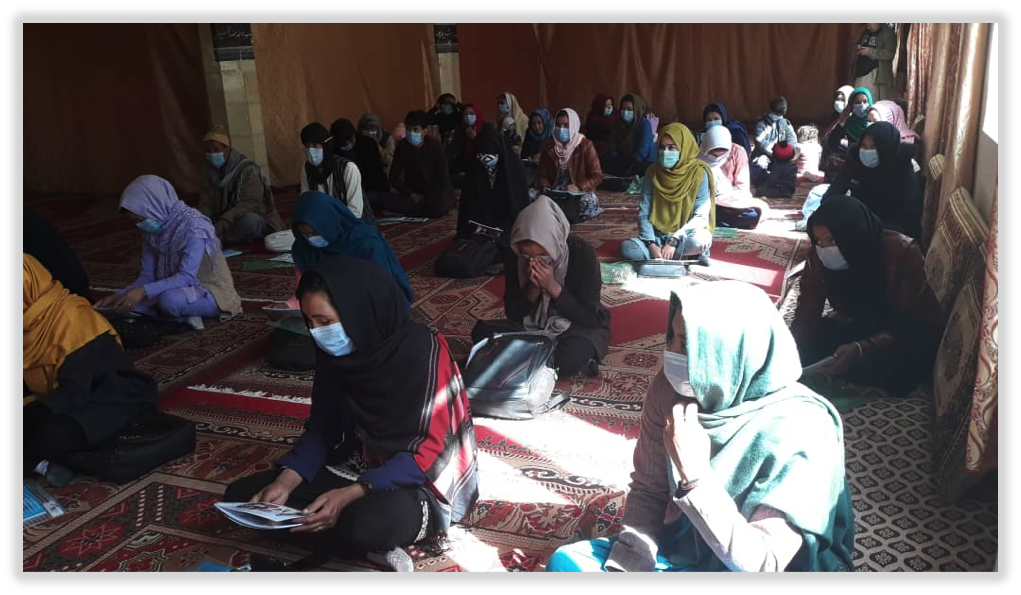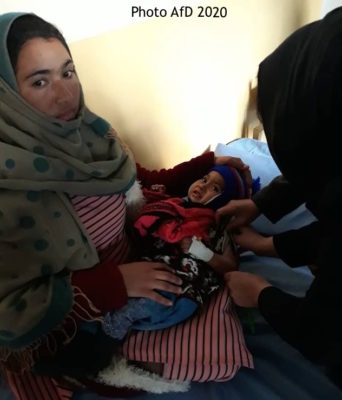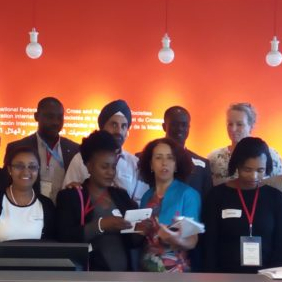BLOG – SUN NEWSLETTER
FAMILY MUAC PROJECT 2020 – SUN POOLED FUND Afghanistan
By Alison Farnham MA, MMedSci, Nutritionist and SUN Pooled Fund Project Consultant, Action for Development
Background
Afghanistan is one of the poorest countries in the world. Since the Soviet invasion in 1979, the country has suffered through more than four decades of conflicts that have taken an incalculable toll on the country’s economic infrastructure and resulted in widespread poverty. According to figures by the Ministry of Economy of Afghanistan and a recent UNDP report on implications of COVID-19 on the economy of Afghanistan, 55% of the country’s population currently lives below the national poverty line and another 20% is highly vulnerable to the risk of falling into poverty.
Although Afghanistan has achieved considerable progress in tackling malnutrition, it remains a national challenge and according to the Global Nutrition Report 2020, the country is off course to meet the Global Targets. Afghanistan has one of the world’s highest rates of stunting in children under-5 years old; 40.9% are stunted and 9.5% are wasted. In Afghanistan today, 14.7 million people are estimated to be living in acute food insecurity[i], with an estimated 2 million children under the age of 5 affected by acute malnutrition[ii].
The Family MUAC Approach
 The Family MUACapproach provides a rapid screening for malnutrition, is a practical and scalable means to detect acute malnutrition at community level and is now widely recognised as an approach with huge potential to improve malnutrition outcomes.
The Family MUACapproach provides a rapid screening for malnutrition, is a practical and scalable means to detect acute malnutrition at community level and is now widely recognised as an approach with huge potential to improve malnutrition outcomes.
The Family MUAC approach was designed in 2012 to empower caregivers to identify undernutrition in their children, allowing them to seek early treatment. This is important as many children with acute malnutrition arrive at medical facilities in a critical condition due to late diagnosis. Normally, community health workers (CHWs) periodically or opportunistically measure children for acute malnutrition in the communities where they work. However, mothers or other primary carers can easily learn to screen their children using the relatively simple Mid-Upper Arm Circumference (MUAC) tapes and testing for oedema. Neither literacy or numeracy skills are required and with basic training, caregivers can take measurements on a regular basis, identify early signs of undernutrition and seek treatment before serious malnutrition occurs.
Benefits of Family MUAC:
- Empowers caregivers
- Increased coverage due to the decentralisation of the service down to the caregiver level
- Allows CHWs more time to attend to other tasks
- Malnutrition identified earlier, leading to:
- More children being treated in less time
- Improved program compliance as families with children who are not as critically ill have lower defaulter rates
- Reduced cost and burden to services
Family MUAC and COVID-19
 The Family MUAC approach is of particular interest during the COVID-19 pandemic. This approach is one of UNICEF and the Global Nutrition Cluster Technical Alliance (formerly GTAM) priority actions to support preparation and response to acute malnutrition in the context of COVID-19[iii]. Additionally, Family MUAC is a recommended measure to ensure continuity and safety of routine services for the early detection and treatment of child wasting in the context of COVID-19 in the WHO/UNICEF Implementation Guidance for Wasting in Children in COVID-19.
The Family MUAC approach is of particular interest during the COVID-19 pandemic. This approach is one of UNICEF and the Global Nutrition Cluster Technical Alliance (formerly GTAM) priority actions to support preparation and response to acute malnutrition in the context of COVID-19[iii]. Additionally, Family MUAC is a recommended measure to ensure continuity and safety of routine services for the early detection and treatment of child wasting in the context of COVID-19 in the WHO/UNICEF Implementation Guidance for Wasting in Children in COVID-19.
The COVID-19 pandemic is particularly impacting Afghan women and children’s health, putting many at severe risk of malnutrition. At the same time as malnutrition is likely rising, health partners are continuing to see lower numbers of patients at fixed health and nutrition facilities due to people’s fear of catching the virus.
Action for Development’s Family MUAC Project
Under the no-cost extension of the SUN Pooled Fund Project Afghanistan, Action for Development (AfD), developed a project to train CHWs in Family MUAC in 5 provinces in Afghanistan – Panjsher, Kabul, Dykundi, Bamyan, Jawzjan – selecting several districts in each province where training in Family MUAC will be provided to caregivers and female CHWs. Community health workers in Afghanistan work as a male-female couple and are based in a health post, serving a population of 1000-1500 per pair. They carry critical health knowledge, skills and tools into communities and homes and are the first point of contact with the health system for many Afghans.
As well as the Family MUAC training, AfD will be providing training using counselling card materials for CHWs. These counselling cards have been adapted by UNICEF Afghanistan for the local context, to ensure that CHWs are up to date with recommended practices for infant and young child feeding adapted to the COVID-19 context.
 After development, the project was presented to nutrition partners in Afghanistan at the monthly Nutrition Cluster meeting in August. Preparation for project implementation began the following month at AfD’s country office in Kabul, where four female health workers received ‘Training of Trainers’ training in FamilyMUAC from Dr Dashti of the Ministry of Health’s Public Nutrition Department (PND) [Photo].
After development, the project was presented to nutrition partners in Afghanistan at the monthly Nutrition Cluster meeting in August. Preparation for project implementation began the following month at AfD’s country office in Kabul, where four female health workers received ‘Training of Trainers’ training in FamilyMUAC from Dr Dashti of the Ministry of Health’s Public Nutrition Department (PND) [Photo].
These 4 trainers will travel to the provinces alongside Master Trainer Dr Zabihullah Rahimi, where between October and December 2020, they will train 500 CHWs and approximately 200 caregivers in the Family MUAC method.
The expected outcome of the training is to support uptake ofroutine services for the early detection and treatment of child wasting in the context of COVID-19.
 Training begins
Training begins
In mid-October the team of trainers travelled from Kabul to Bamyan province where they embarked on the first training sessions. Training was provided to 120 CHWs and 40 caregivers over 8 health facilities in 3 districts. Heads of clinics and Community Health Supervisers(CHS) also joined the training sessions. MUAC tapes were distributed and each trained CHW received a copy of the IYCF counselling cards.
Next the team travelled to Dykundi province where they noted that the long distances to be covered between health facilities was a challenge. Notwithstanding the distances, the team was able to provide training to120 CHWs and 45 caregivers in 3 districts. Ten volunteers from a health in the community group also joined the training. The CHWs and CHS noted the need for Family MUAC training in other districts of Dykundi in order to combat high levels of malnutrition. Caregivers gave very positive feedback regarding the MUAC tapes, stating that they must travel long distances to access health facilities so they welcomed the ability to take measurements of their children at home.
Support for the Family MUAC Project
Action for Development would like to acknowledge the support of UNICEF Afghanistan for this project through the sharing of training materials and IYCF counselling cards adapted to the Afghanistan country context and translated in to local languages.
AfD would also like to thank the Public Nutrition Department for their support and particularly Dr Dashti for providing the training of the trainers. Also the BPHS[1]providers in the provinces (Aga Khan Foundation and MOVE) for their support in selecting the districts and facilitating the training in those districts.
Additionally, the technical support of the Global Nutrition Cluster (GNC) Technical Alliance (formerly the GTAM) was requested in order to ensure a strong monitoring, evaluation and learning (MEL) component. The GNC Technical Alliance is set up to identify technical gaps and leverage the technical expertise of the nutrition community to fill those gaps. In this case Action Against Hunger UK, technical experts and leaders in CMAM MEAL, are providing the technical support. The MEL will identify best practices and lessons learned in order to inform the development of future Family MUAC projects and advocate for the approach across Afghanistan, and globally.
Next Steps
The next Family MUAC training sessions will take place in Jawzjan, Panjsher and finally Kabul provinces. Updates, photos and the final report can be found on Action for Development’s website.
For further information, please contact: ali.farnham@actfordev.org
#nutritioncantwait #SUNPooledFund





[1]Basic Package of Health Services
[i]https://www.humanitarianresponse.info/en/operations/afghanistan/document/afghanistan-covid-19-multi-sectoral-response-operational-20
[ii]OCHA – Afghanistan Humanitarian Response Plan, 2020
[iii]see the March 27th guidance brief for the Management of Child Wasting in the context of COVID-19, (https://acutemalnutrition.org/en/resource-library/3BvzX2BOpSJTYBSoPcb2C0).




